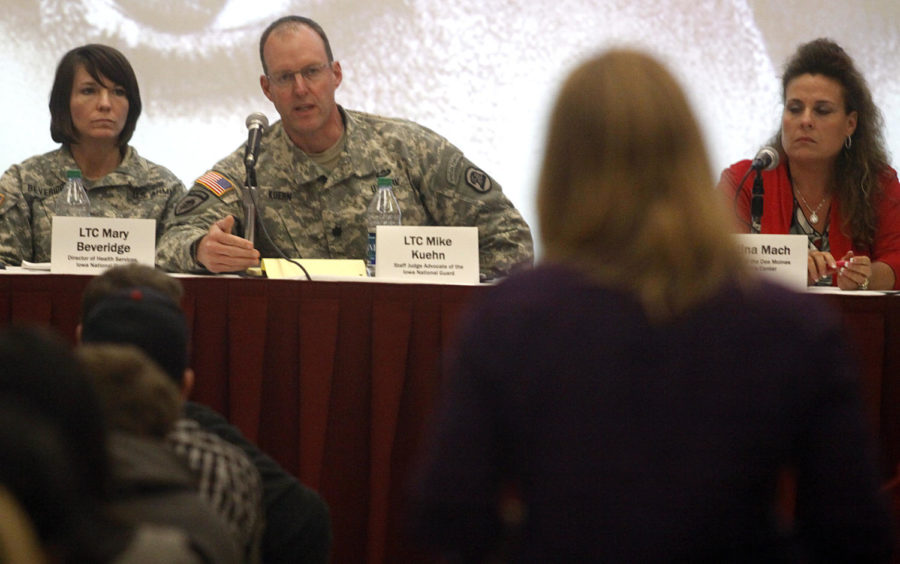Documentary shines light on military sexual assaults
Lt. Col. Mike Kuehn, staff judge advocate for the Iowa National Guard, explains the current procedure for rape victims in the military. The Invisible War is an investigative documentary about rape within the U.S. Military. The documentary was shown on April 15 in the Sun Room of the Memorial Union.
April 15, 2014
Sexual assault within the military is an ongoing issue that Kirby Dick addressed in his documentary shown to students Tuesday.
The event started with a showing of Dick’s documentary “The Invisible War.” The 99-minute film featured the stories of veterans who survived sexual assault while in the military.
“The Invisible War centers around the stories and experiences of military sexual trauma,” said Christian Wimmer, psychologist for Student Counseling Services on campus.
According to the film, 20 percent of women who enter the military get sexually assaulted in some way, often by the men who were close to them or the men to whom they reported. A predicted 500,000 women in total have fallen victim to assault while serving.
Because many assaults are committed by high-ranking officials, victims often feel that they cannot report the issue. All of the stories within the documentary came from women who had either not reported their incident, or had reported the issue but had nothing done about it.
“It takes some courage to come and look at these things and feel these things and watch this documentary with us,” said Wimmer. “Military sexual trauma is a significant issue, with the reality being that a female soldier in Iraq and Afghanistan is more likely to be raped than killed or injured by enemy fire.”
Though the stories in the film were mostly from women, men have also been sexually assaulted while serving in the military. The documentary states that about 1 percent of men in the military were assaulted in 2011, almost 20,000 men in total.
“This issue of sexual assault is widespread, if you will, throughout the military, but not every leader throughout the military has dealt with this one-on-one,” said 1st Lt. Joel Sage of the Iowa National Guard. “This film does a good job of just preparing leaders to deal with these issues as they take on these leadership roles.”
After the film, a panel comprised of military officials and people who work with sexual assault cases stayed to answer questions about the issue.
“I do feel that our soldiers, our survivors, are really feeling more confidence in the system and they really feel like if they come forward, they’ll be listened to, they’ll be believed and something will happen,” Sage said when asked what changes he has noticed since the release of the documentary.
The other four panel participants agreed with Sage that changes have been noticeable over the past two years.
“I have had more referrals in the last two years than I had in the total 12 years prior,” said Cynthia ConteCQ, military sexual trauma coordinator for the Department of Veterans Affairs.
Lt. Col. Mike Kuehn, judge advocate for the National Guard, said that the military has recently created a special victims council, which is designed to help victims during the prosecution process.
The third military official in attendance was Lt. Col Mary Beveridge, who spoke of her personal experiences as a woman in the military.
“I would be lying to say that I had not faced difficult situations as a minority, being one of the few lieutenant colonel females in the Iowa National Guard,” said Beveridge. “I can have a solid voice [in this issue], and I think that it does make a difference.”
Wimmer facilitated the panel and ended the night by telling everyone in attendance that, while issues like this one are not easy to address, it’s necessary to have the discussions that aren’t always easy.
“You’re not going to walk out of here feeling really great tonight,” said Wimmer “We’re looking at things honestly, we’re opening this conversation and we’re making the invisible visible.”







